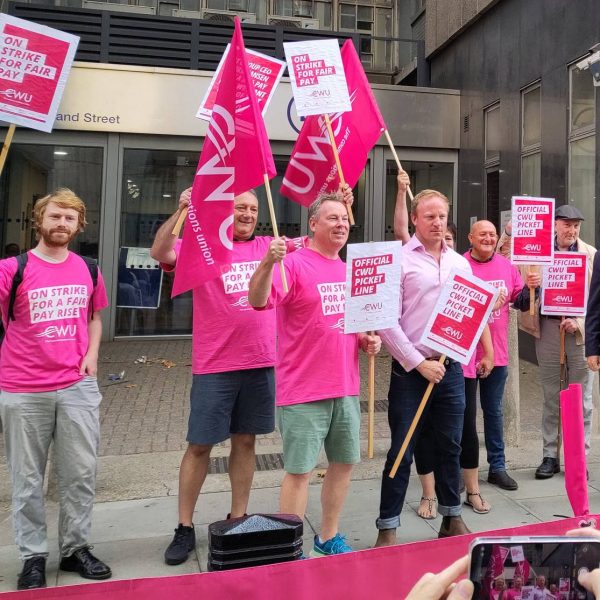BT and Openreach UK Staff Vote to Accept Pay Offer

As expected, the Communications Workers Union (CWU) – representing up to 38,000 of BT and Openreach’s employees – has voted to accept last month’s pay offer (here) from the UK telecoms giant, which will avert any further risk of strike action over Christmas. But the fireworks may begin again next September 2023.
Just to recap. The fully consolidated and pensionable settlement, which ends six months of industrial unrest at BT Group, comes on top of the £1,500 flat-rate increase that was handed down by BT in April this year. The deal thus equates to a headline fully consolidated and pensionable pay increase totalling £3,000 in the current financial year.
The CWU had already given its support to the proposed pay offer and so it was always highly likely to be accepted. In the end, the deal was supported by just over 81% of members participating in a consultative ballot, which closed yesterday morning.
Advertisement
Andy Kerr, CWU Deputy General Secretary, said:
“There’s certainly going to be no let up for union’s negotiating team over the coming period,” stresses deputy general secretary Andy Kerr.
From the CWU’s perspective, the deal that members have ratified this morning is just the start of a journey that will see two further sets of pay negotiations in the next 15 months and the long-overdue conclusion of discussions to resolve all current unagreed pay and grading issues.”
Under the terms of the agreement, the next pay review date moves from April 1st to September 1st in 2023. This is to allow for a period of intensive negotiations aimed at resolving a raft of longstanding pay and grading disagreements, which are may result in further pay uplifts for some. A new round of across-the-board pay talks will begin in earnest immediately after that.
From 2024 onwards, the annual pay review will revert to April 1st, meaning members will be due for a further increase just seven months after next September’s review date.
Mark is a professional technology writer, IT consultant and computer engineer from Dorset (England), he also founded ISPreview in 1999 and enjoys analysing the latest telecoms and broadband developments. Find me on X (Twitter), Mastodon, Facebook, BlueSky, Threads.net and Linkedin.
« Rural UK ISP Gigaclear Extends FTTP Broadband in Warwickshire






















































Anyone know the maths on how much of the extra £1500 the staff will have lost due to striking?
Appreciate its a bit more than just pay, but I’m just curious what the actual benefit of the strikes were, I’ve lost count of how many days they had.
Compound interest applies to pay rises. Striking for a day means you lose the pay for that day. A 3% pay rise means your pay will go up by 3%. If you get a 3% pay rise for each of the next five years that equates to a 16% pay rise over that period. Think of a strike in monetary terms as the opposite of a bonus. This is why I would much rather have a larger pay rise than a larger bonus.
In the long run, strikes usually work. If they had no effect workers would never strike and companies would never negotiate and would never give you pay rises.
Depends how many strike days individuals lost. Not everyone would be working those strikes days anyway. Some may have not been due to work any of the strike days depending on their roster pattern.
For those that hope to stay in the business for a few years yet the agreement will be worthwhile in the long run. Those that leave the business in the next year or so may not see the benefit
@the Witcher Those that leave will absolutely still see the benefit. When a major player in an industry, such as BT, sets a wage level, this ripples through the whole industry. If one employer is paying £100, how does one paying £90 now attract talent? At the very least they need to come closer to matching it.
Companies don’t award annual pay rises out of compassion. They do so because they need to pay the market rate. Think of yourself as a mini corporation. BT want to procure your labour. To do that they have to pay you £100. For that £100 you can buy 100 things. This year those 100 things that you bought last year now cost you £110 to buy. Now you can either buy 89 things instead. If you take no action, next you can only buy 78 things. Then 66, then 50 and so on. To prevent that, you have two options. You can either find a job elsewhere, but not all of the tens of thousands of other mini corporations can also do that at the same time. Or you withhold your services, in part, until the big corporation pays you fairly.
Striking isn’t merely about a couple of percentage points for that one year. It is about ensuring wages keep up with where they should be over the course of your working life. And let’s face it, they aren’t for the majority of people. No one should have to strike, but if pay and conditions weren’t being eroded at the same time as companies and CEOs making staggering profits what alternatives do people have? Don’t chose to be poorer.
@Bob , that assumes those leaving don’t retire from the workforce entirely or move ro another industry. Many have become disillusioned with the telecoms industry and looking for alternatives
Should’ve held for longer with more strikes like the train commies
riduculous comment frankly
Fastman still any comment on how Lightspeed is remotely close to 200k homes passed? Because that was an actual ridiculous comment
Think that the government couldn’t scupper agreements at the final hour really helped here to be honest. The CWU and BT were able to reach an agreement and the action could end: the government couldn’t interfere in an attempt to, in your case evidently successfully, demonise unions.
Don’t think all that many rail workers, the ones who voted overwhelmingly to renew their strike action mandate in November, can be described as ‘commies’.
One of their leaders literally lives in Corbyn Islington on a 3 bed council flat while earning a 6 digit salary. When confronted with this he claims it is in his right to ripoff the taxpayer rather than giving it up for someone who actually needs and deserves it so yes commie is the accurate term
Are the workers happy with the pay increase or just fed up with the left wing union doing a job for the Labour Party at their expense.
To cwu waste of space : surely if the union was “doing a job” they would not have recommended the deal? They would be balloting for more strikes? The majority (4:1 by the vote) are happy with 10% for most engineers and 16% for call centre staff this financial year, resolving unagreed grades and a payrise again in sept.
We are very pleased with our union. Also pleased with the support we had from Labour party.
The shareholders were happy with £700M dividends and the ceo with his 32% rise and £3.5M. The only people not happy seem to be right wing loons posting on the internet.
Happy with the pay rise I reckon.
Those same workers voted in favour of the action in the first place. They went on strike because the cost of living was rising much more quickly than their salaries leaving them poorer while simultaneously having their working conditions changed.
Much the same as railway workers, health care workers, border force workers, etc.
Stop believing what the Express, Mail and Telegraph tell you. Strikes for political reasons would have happened earlier. These were all triggered by the cost of living rocketing and government refusing to pay these people to keep pace, instead trying to claim that a supply side inflation shock was the fault of wage rises.
Just FYI: supply side inflation is what it says it is, triggered by cost of supplying goods and services rising. Demand side is where wage rises and interest rates come in. Wage rises in theory increase demand, as do interest rates.
The really strange thing is the same people who believe in trickle down economics also seem to think that huge payouts to shareholders don’t contribute to demand side inflation, in which case clearly the wealth isn’t trickling down, is it?
As an employee but not in the union I’m happy with the Payrise. I wouldnt have supported anymore strike days as losing too much money by doing so.
Where is the Prospect info?